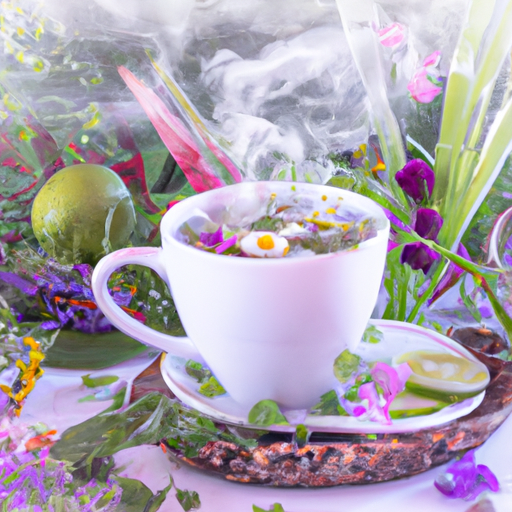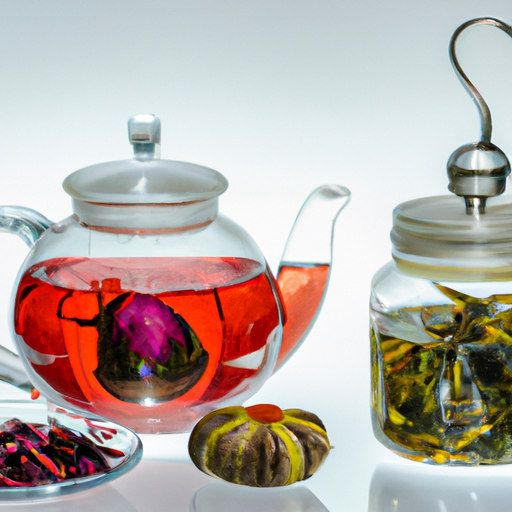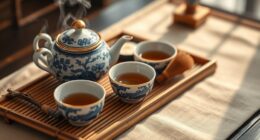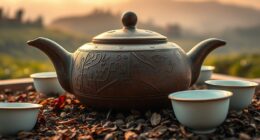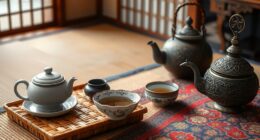You have a blood test approaching and are curious if you can continue to drink herbal tea while fasting. Allow me to provide some insight on this topic.
Fasting before blood work is often necessary to ensure accurate test results. However, the impact of herbal tea on these results is not well-known. It’s always best to consult with your healthcare provider for personalized advice.
While herbal tea may be a comforting and soothing beverage, it’s important to consider alternatives during fasting to avoid any potential interference with your blood test results. On the other hand, herbal tea may offer some potential benefits during fasting, such as hydration and relaxation. However, caution should be exercised, as certain herbal teas can affect blood sugar levels or contain compounds that may interfere with specific blood tests.
Ultimately, making an informed decision based on your healthcare provider’s guidance is crucial.
Key Takeaways
- Fasting before blood work is necessary for accurate test results.
- Certain herbal teas can affect blood sugar levels or interfere with specific blood tests.
- Herbal teas with diuretic properties can cause dehydration and affect blood markers.
- Decaffeinated herbal teas like rooibos or peppermint can be consumed during fasting.
Understanding the Purpose of Fasting for Blood Work
You’re probably wondering why you have to fast before getting blood work done. Well, fasting is necessary because it helps ensure accurate blood test results. When you eat, your body breaks down carbohydrates into glucose, which is a type of sugar. This glucose then enters your bloodstream, causing an increase in your blood sugar levels.
Fasting for a specific duration, usually 8-12 hours, allows your body to stabilize blood glucose levels. This is important because many blood tests, such as those measuring cholesterol or blood sugar, require a baseline reading without interference from recent food intake.
Now, let’s talk about the impact of herbal tea on blood test results.
The Impact of Herbal Tea on Blood Test Results
When abstaining from food and beverages, consuming herbal tea may potentially affect the outcome of your blood tests.
While herbal teas are often considered healthy and hydrating, they can impact your hydration levels, which may in turn affect certain blood markers.
For example, herbal teas with diuretic properties, such as dandelion or nettle tea, can increase urine production and potentially lead to dehydration. This can cause changes in blood markers like electrolyte levels or kidney function tests.
Additionally, some herbal teas contain compounds that can interfere with specific blood tests, such as those measuring liver enzymes or clotting factors.
Therefore, it’s important to consult with your healthcare provider before consuming herbal tea while fasting for blood work to ensure accurate and reliable test results.
Consult with Your Healthcare Provider
Make sure to reach out to your healthcare provider for guidance and advice regarding your specific situation. They’ll be able to provide you with the most accurate information about whether or not herbal tea is okay to consume before blood work.
Here are some consultation options to consider:
-
Schedule an appointment: Set up a time to speak with your healthcare provider in person or over the phone to discuss your fasting requirements and any concerns you may have.
-
Send a message: Many healthcare providers offer secure messaging platforms where you can ask questions and receive timely responses. This can be a convenient option if you have a quick question or need clarification.
-
Attend a virtual consultation: With the rise of telemedicine, you may be able to schedule a video call with your healthcare provider to discuss your fasting requirements and get personalized advice.
-
Seek a second opinion: If you’re unsure about the advice given by your healthcare provider, it’s always an option to seek a second opinion from another trusted healthcare professional.
Consulting with your healthcare provider is crucial to ensure that you’re following the appropriate guidelines for your specific situation. If herbal tea isn’t recommended during your fasting period, there are alternative options available.
Alternatives to Herbal Tea During Fasting
If herbal tea is not on the menu during your fasting period, there are plenty of other flavorful options to sip on and tantalize your taste buds. When it comes to non-caffeinated beverages, there are several alternatives to consider. One great option is plain water, which is essential for staying hydrated and supports the body’s natural detoxification processes. Another option is herbal infusions, such as chamomile or mint, which can provide a soothing and refreshing experience. Additionally, you can try fruit infused water, where you can add slices of your favorite fruits to water for a burst of flavor. Coconut water is also a good choice as it is low in calories and naturally hydrating. Lastly, if you’re looking for a warm beverage, opt for decaffeinated herbal teas like rooibos or peppermint. These alternatives can help you stay hydrated and enjoy a variety of flavors during your fasting period. Transitioning to the next section, let’s explore the potential benefits of herbal tea during fasting.
Potential Benefits of Herbal Tea During Fasting
Sipping on a warm cup of fragrant chamomile or mint infusion can provide a soothing and refreshing experience during your fasting period. Herbal teas, such as chamomile, mint, or ginger, can offer potential benefits while fasting for blood work. These teas are often caffeine-free and can help hydrate the body, which is important during fasting.
Additionally, certain herbal teas, like ginger, have been shown to have anti-inflammatory properties, which can be beneficial for overall health. However, it’s important to note that herbal teas shouldn’t be consumed in large quantities, as they may interfere with the accuracy of blood test results. It’s always best to consult with your healthcare provider before incorporating herbal teas into your fasting routine.
Transitioning into the subsequent section about ‘precautions and considerations’, it’s crucial to be aware of potential interactions between herbal teas and medications.
Precautions and Considerations
Before diving into the precautions and considerations, it’s essential to tread carefully and be mindful of the potential dance between herbal infusions and certain medications. Although herbal tea is generally considered safe, it’s important to exercise caution and understand the potential risks involved.
Some herbal teas may interact with medications, affecting their effectiveness or leading to unwanted side effects. It’s crucial to consult with a healthcare professional before incorporating herbal tea into your fasting routine, especially if you’re taking medications or have any underlying health conditions.
Additionally, when preparing herbal tea, ensure that you use high-quality ingredients and follow proper brewing methods to maximize its benefits and minimize any potential risks.
By understanding these precautions and taking the necessary steps, you can make an informed decision about whether herbal tea is suitable for you during fasting for blood work.
Making an Informed Decision
Consider carefully whether incorporating herbal infusions into your routine is the right choice for you during fasting for blood work, as it can have a significant impact on your overall well-being. When making an informed decision, it’s important to understand the potential side effects and the importance of hydration.
Herbal teas can be a refreshing and hydrating option during fasting for blood work. However, it’s crucial to choose teas that don’t contain caffeine or other additives that may interfere with the fasting process. Additionally, certain herbs may have diuretic properties, which can increase urine output and potentially lead to dehydration. To ensure adequate hydration, it’s recommended to consume water alongside herbal infusions.
Moreover, some individuals may experience gastrointestinal discomfort or allergic reactions to specific herbs. If you have any pre-existing health conditions or concerns, it’s advisable to consult with a healthcare professional before incorporating herbal teas into your fasting routine.
Overall, staying hydrated and being mindful of potential side effects will help you make an informed decision about incorporating herbal infusions during fasting for blood work.
Frequently Asked Questions
Can I drink other types of beverages during fasting for blood work, besides herbal tea?
While herbal tea is a good choice during fasting for blood work, there are other beverages you can drink. However, it’s important to note the benefits of herbal tea, such as hydration and potential antioxidant properties.
How long should I fast before getting blood work done?
The fasting period for blood work is typically 8-12 hours. After fasting, it is important to eat a balanced meal to restore energy levels and prevent low blood sugar.
Are there any specific herbal teas that are known to interfere with blood test results?
There are no specific herbal teas known to interfere with blood test results. However, certain herbal teas may affect fasting blood glucose levels. It’s best to consult with a healthcare professional before consuming herbal teas while fasting for blood work.
Can I add sweeteners or milk to my herbal tea while fasting for blood work?
Adding sweeteners or milk to herbal tea while fasting for blood work can potentially affect the accuracy of your results. Sweeteners may alter blood sugar levels, while milk can interfere with certain blood tests.
What are the potential risks or side effects of consuming herbal tea during fasting for blood work?
Potential risks of consuming herbal tea during fasting for blood work include interference with blood test results and inaccurate readings. It is important to avoid herbal tea to ensure accurate blood work and reliable results.
Conclusion
In conclusion, it’s best to consult with your healthcare provider before consuming herbal tea while fasting for blood work. While herbal tea may have potential benefits, it could also impact blood test results. It’s important to consider alternatives to herbal tea during fasting to ensure accurate results.
By making an informed decision and taking precautions, you can ensure that your fasting period is effective and that your blood test results are reliable. Remember, your healthcare provider is the best source of guidance in this matter.




